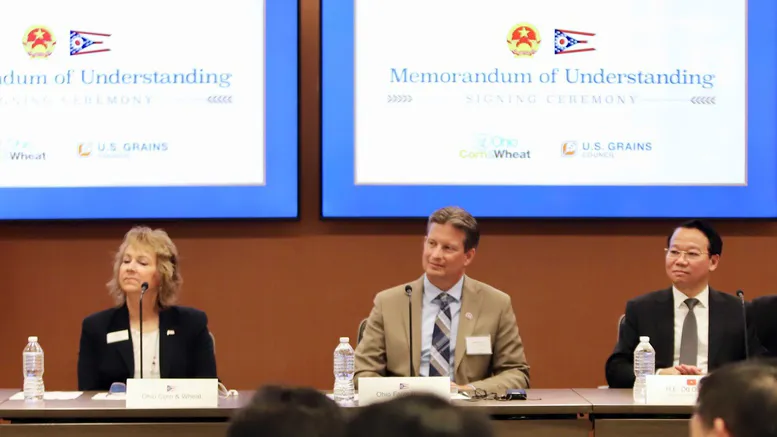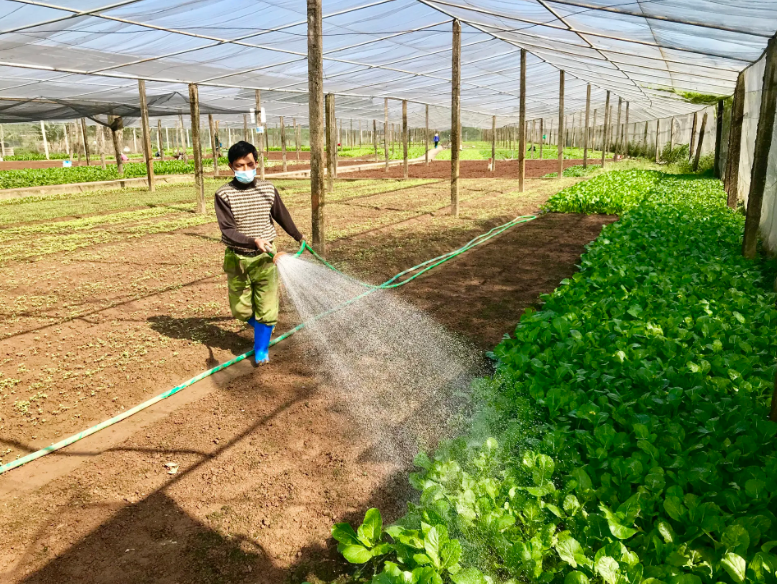Vietnam, US boost farm trade
Agricultural cooperation will lay the foundation for a sustainable and comprehensive partnership, serving the interests of farmers and consumers in both nations while contributing to global food security.
THE HANOI TIMES — Vietnam and the US are accelerating negotiations on agricultural tariffs and maintaining stable supply chains as part of efforts to boost cooperation in agriculture.

Meeting between Minister of Agriculture and Environment Do Duc Duy and US associations, business in Ohio. Photo: MAE
The move followed a visit by a delegation from Vietnam’s Ministry of Agriculture and Environment (MAE), headed by Minister Do Duc Duy, to various associations and agricultural enterprises in the US. The delegation continued its mission in Columbus, Ohio.
On June 4, Duy met with Ohio’s Director of Agriculture, Brian Baldridge, who stated that Vietnam and the US complement each other rather than compete directly, particularly in agricultural trade. Ohio recognizes Vietnam’s potential and the opportunities to boost bilateral trade.
Baldridge expressed his delight in collaborating with Vietnamese agricultural partners to create new opportunities for Ohio's farmers, agribusinesses, and rural communities.
Notably, the two officials agreed to propose sound policies to their respective governments to prevent supply chain disruptions.
"Not imposing reciprocal tariffs of up to 46% will benefit not only Vietnamese producers and farmers, but also create jobs for many workers in the US supply chain. American consumers will benefit from having access to reasonably priced, high-quality agricultural products and food from Vietnam," affirmed Minister Do Duc Duy.
On the same day, the Vietnam–Ohio Agricultural Business Forum took place in a productive atmosphere. Stakeholders exchanged views and signed memoranda of understanding (MoUs) on importing animal feed materials from Ohio. The total value of the MoUs exceeded US$600 million. Many Vietnamese companies also established connections with Ohio partners to promote the import of key products, such as raw wood, fruit, and meat.
The newly signed trade agreements between Vietnamese enterprises and the state of Ohio have received strong support from US farmers' organizations and agricultural commodity traders.
Patty Mann, Chairwoman of the Ohio Corn and Wheat Growers Association, said Vietnam is a reliable, growing export market and that such partnerships ensure the continued supply of Ohio-grown, high-quality products worldwide.
Mann noted that the timing of these agreements is particularly meaningful for Ohio’s agricultural economy amid the challenges local producers face, such as rising production costs, declining commodity prices, and the urgent need to expand into new markets for staple products like soybeans, grains, meat, wood, and other agricultural goods.
On June 2 in Iowa, the US major agricultural state, Vietnamese businesses signed four significant memoranda of understanding (MoUs), with the total value of agricultural imports from US companies reaching $800 million. In addition, Vietnam's Department of Livestock Production and Animal Health established a dialogue channel with the Iowa Pork Producers Association to cultivate public-private cooperation between the two countries.
Iowa’s Agriculture Secretary Mike Naig highlighted Vietnam’s strong commitment to purchasing US agricultural products, from dried distillers grains, corn, and soybeans to ethanol.
“This is not just about new deals, but about deepening relationships between businesses and organizations. We deeply value that," he said.

Tending safe vegetables in Tien Le Village, Tien Yen Commune, Hoai Duc District, Hanoi, Vietnam. Photo: Ngoc Anh/The Hanoi Times
Enhancing production capabilities
At the Vietnam–Ohio Business Forum on June 4, attended by 50 businesses from each side, delegates agreed that significant room remains to expand agricultural cooperation, especially trade.
Minister Do Duc Duy emphasized: “The key objective of today’s forum and the overarching mission of economic relations between our two countries is to move toward a more balanced trade relationship.”
In that spirit, Vietnam shared information with US businesses and distributors, particularly those in Ohio. This is an opportunity to increase exports of notable Ohio products, such as corn, soybeans, animal feed ingredients, and sawn timber, to the Vietnamese market.
Lyndsey Erb, the US Soybean Export Council's (USSEC) Director of Industry Relations, said they closely follow Vietnam’s industrialization and modernization, particularly the impressive growth of its aquaculture sector. Vietnam has risen to become the fourth-largest aquaculture producer globally. Demand for soybean meal and other animal feed products is expected to double by 2028.
"When the US Grains Council (USGC) opened its first representative office in Ho Chi Minh City in 1994, we could not have imagined how strong and deep the cooperation between the two sides would become. Together, we are building a more secure food future for both countries," said Stella Qian, Global Strategy Director at the USGC.
Businesses and associations hope that the governments of Vietnam and the US will continue fostering favorable conditions that promote bilateral trade and strengthen complementary agricultural supply chains. The shared goal is to provide practical benefits to millions of farmers and consumers in both countries while contributing to global food security.
Alongside trade promotion activities, Vietnam is focusing on technical cooperation to meet the sanitary and phytosanitary (SPS) standards of the US market.
For the US, SPS is more than a technical barrier; it is a "guardrail" system aimed at one goal: protecting public health through transparency, science-based evidence, and non-discriminatory practices. The US sees SPS as both a mandatory checkpoint and a fair set of rules.
Ngo Xuan Nam, Deputy Director of the Vietnam SPS Office, confirmed that Vietnam has always adhered to SPS commitments. Since joining the WTO, Vietnam has implemented the SPS Agreement and incorporated SPS provisions into numerous bilateral and multilateral trade agreements.
On June 5, the Vietnam SPS Office welcomed Bagie Sherchand, Director of Strategic Partnerships and Consortia at the National Cooperative Business Association CLUSA International (NCBA CLUSA).
According to Bagie, SPS is not just a set of standards or a risk management tool. It is a connective thread linking the two countries across the Pacific in a shared responsibility for global public health. And the starting point is not containers of fruit waiting at the port, but the hands of farmers still lacking access to critical information and capacity.
Bagie expressed her willingness to support Vietnam in accessing successful early warning models in the US and other countries with similar concerns, where alerts are shared via mobile apps and automated messaging systems to cooperatives. "The most important thing is that farmers understand risks before risks become reality," she emphasized.












